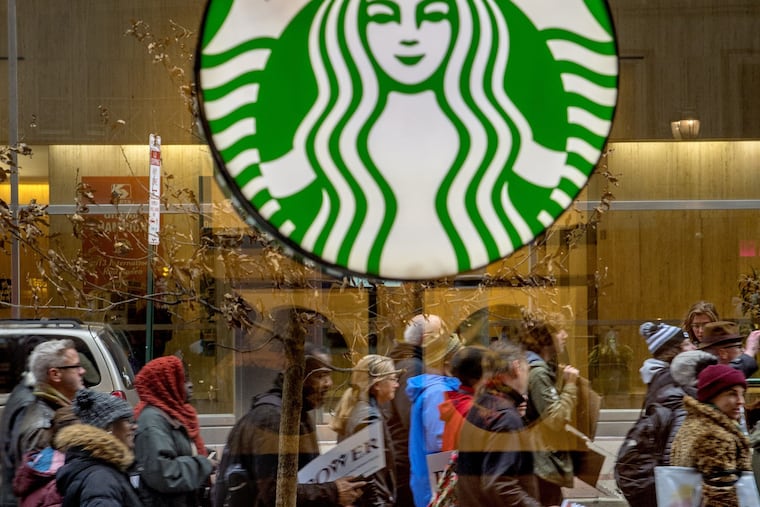Starbucks ordered to pay $25.6M to manager who says she was fired for being white after viral Philly arrests
A Camden jury ordered the coffee giant to pay $25.6 million to Shannon Phillips, who was fired in 2018 following the widely publicized arrests of two Black men at a Center City Starbucks.

A federal jury has awarded $25.6 million to the white Starbucks manager fired in 2018 following the widely scrutinized arrests of two Black men at a Philadelphia store caught on viral video. The arrests prompted national uproar, protests at the Center City location, policy changes, and questions over racism, policing, and public safety.
Following a six-day trial in Camden, the jury Monday ordered Starbucks to pay Shannon Phillips of Woolwich Township $25 million in punitive damages and $600,000 in compensatory damages, finding that the coffee giant fired Phillips amid backlash for the episode at the 18th and Spruce Streets location because she was white.
Jurors determined that Starbucks had violated Phillips’ federal civil rights, as well as New Jersey laws prohibiting racial discrimination, when it fired her from her post as the Philadelphia-area regional operations director amid fallout surrounding the men’s arrests.
Phillips’ attorney, Laura C. Mattiacci, said her client was Starbucks’ “scapegoat” to “show action being taken” following the widespread outrage after the incident. When the verdict was read in court Monday, Phillips broke down into tears and hugged her lawyer, Law360 reported.
The lawsuit, filed in 2019, argued that Phillips — a Starbucks employee for nearly 13 years who oversaw retail operations in southern New Jersey, Philadelphia, Delaware, and parts of Maryland — had nothing to do with the men’s arrests. Rather, the lawsuit argued Phillips was terminated less than a month after the viral encounter because she objected to placing the white district manager at the Spruce Street location on administrative leave for allegedly paying Black workers less than their white counterparts — claims Phillips said she knew to be untrue.
» READ MORE: Ex-Philly Starbucks director claims she was fired following wrongful arrests because she’s white
At the same time, Phillips’ lawsuit argued, Starbucks declined to punish a Black district manager who supervised the Spruce Street store where the arrest took place, while suspending and eventually firing another Philadelphia district manager, who was white. Paul Sykes, the Black district manager who oversaw the Spruce Street store, told the jury that Phillips was a well-liked manager who worked tirelessly following the arrests, according to Law360.
In court filings, lawyers for Starbucks argued that Phillips, as a regional district manager, was fired not because of her race, but because she “failed to lead” her team by remaining mum following the men’s arrests and ensuing outcry. “During this time of crisis, Starbucks’ Philadelphia market needed a leader who could perform. Ms. Phillips failed in every aspect of that role,” the company’s lawyers wrote.
According to Law360, Starbucks’ attorneys told the eight-member jury that Phillips was replaced by another white regional director because of his leadership experience in crises such as the 2013 Boston Marathon bombings. “A peacetime leader is very different from a wartime leader,” lawyer Richard R. Harris reportedly told the panel.
A Starbucks spokesperson declined to comment Wednesday on the jury’s verdict.
» READ MORE: One year later: A timeline of controversy and progress since the Starbucks arrests seen around the world
The initial encounter occurred in April 2018, when Rashon Nelson and Donte Robinson — both 23 at the time — sat in the Starbucks in Rittenhouse Square, waiting to meet with a business associate. When Nelson asked to use the restroom without first making a purchase, he said, he was refused because he wasn’t a customer, and a manager asked the men to leave the store. When they didn’t, a store employee called the police.
What happened next — police leading the men out of the store in handcuffs — was viewed millions of times in a no-longer-public viral Twitter video, sparking mass outcry, roundtable discussions of racism in retail, protests, and a media firestorm. No charges were filed.
Starbucks CEO Kevin Johnson publicly apologized and flew to Philadelphia to meet with the men and government officials, and Starbucks closed its U.S. stores for a day for racial-bias training for the company’s 175,000 employees. The Seattle-based corporation implemented a policy to make its bathrooms open to anyone, which was modified in 2022 to allow Starbucks employees to close restrooms in the event of safety concerns. In the wake of the fallout, Philadelphia police also issued a new policy encouraging officers to de-escalate and use “greater discretion” when determining whether to arrest people accused of trespassing on private property.
A month after they were arrested, Nelson and Robinson reached an undisclosed financial settlement with Starbucks, which included free college tuition. Separately, the pair also settled with the city for a symbolic $1 each and a pledge from the city to spend $200,000 on a program dedicated to teaching Philadelphia public school students about financial literacy, entrepreneurship, and the community impacts of small business.
In an interview following the incident, Robinson said he wanted to make sure “this situation doesn’t happen again,” and for “a young man or young men to not be traumatized by this and instead motivated, inspired.”